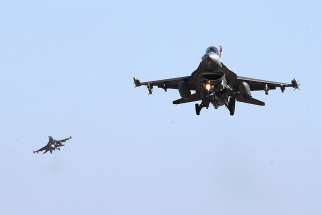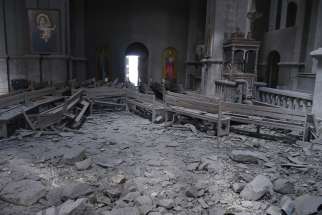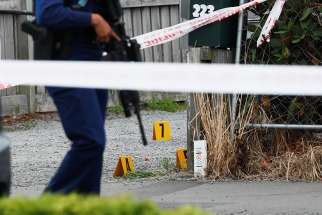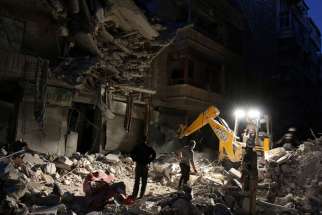As deficits skyrocket and Canada’s debt-to-GDP ratios teeter on the brink, Sr. Mary Ellen Francoeur has a plan to save the government billions.
Canadian weapons fuelling conflict
It’s nice that Canada is going to look into how Canadian-made targeting systems are being used by the Turkish and Azerbaijani military, both engaged in active wars, before allowing any more sales or exports of the systems. But Ottawa will have to do more if it intends to live up to its signature on the international Arms Trade Treaty and international human rights law in general, according to a researcher at Project Ploughshares.
Editorial: No place for guns
It turns out that banning assault weapons doesn’t have to be so difficult after all. All it takes is courage, resolve, leadership — and a touch of common sense.
Logic of weapons, self-interest wreak havoc on Mideast, Pope says
VATICAN CITY – Pope Francis said he will never give up calling for stronger efforts to bring peace to the Middle East and for people to stop being indifferent to the fate of the region's people.
Price of peace
Addressing U.S. congress last September, Pope Francis bluntly dissected the multi-billion-dollar international arms industry.
World needs better tracking, disposal of weapons, Vatican official says
VATICAN CITY - The international community must get serious about enforcing humanitarian laws that make it possible to secure or destroy explosive devices leftover from a war before those devices harm innocent civilians or fall into the hands of terrorists, a Vatican official said.
Archbishop Silvano M. Tomasi, the Vatican's representative to U.N. agencies in Geneva, addressed a U.N. conference reviewing compliance with an international agreement on the restriction and use of certain conventional weapons; the conference was held in Geneva Nov. 12-13.
The focus of the conference was on laws dealing with the tracking and disposal of "explosive remnants of war," such as landmines and roadside bombs.
Failure to implement the agreement, Archbishop Tomasi said, has meant that many explosive weapons are not monitored during a conflict or removed after a conflict ends. As a result, they fall into the hands of terrorist groups and criminal organizations, and pose a threat to innocent civilians, he said.
Any hesitation in documenting or removing the explosive remnants of war, the archbishop said, "means more victims and bigger economic and social costs, and long-term hampering of development."
In past and present conflicts, civilians' safety has not been a priority, and "international humanitarian law was merely a set of non-respected rules," he said.
Archbishop Tomasi called for full adherence to the international agreements and international cooperation in monitoring compliance. "This is the only way to protect the civilian population, and in some cases the national community as a whole, from the consequences of explosive remnants of war."
The international community has a moral responsibility to protect civilians from explosive weapons during and after conflicts, the archbishop said. "Civilians should not have to pay twice for the absence of a secure, free and peaceful environment."







